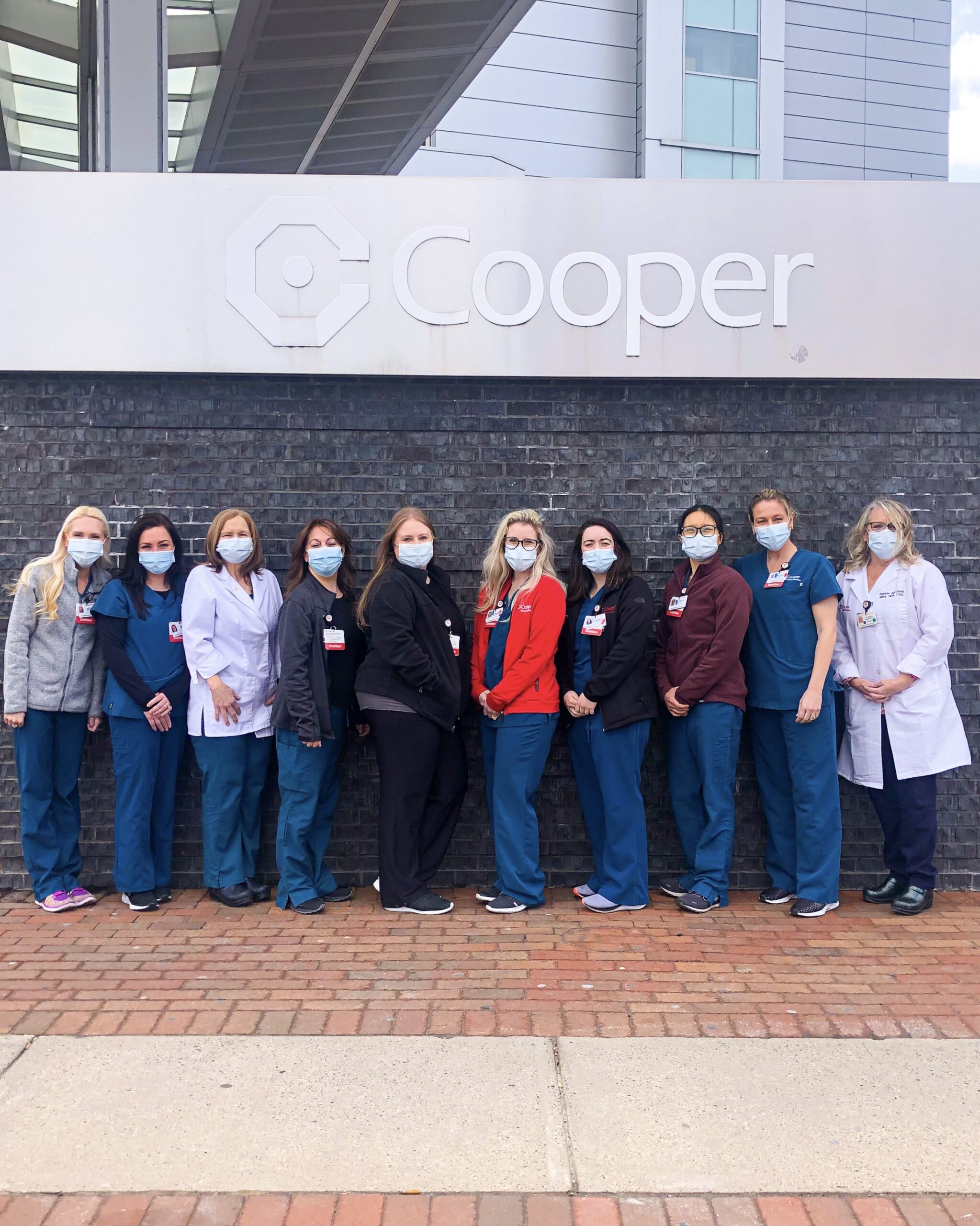
Our inpatient dietitian team at Cooper.
Today is National Registered Dietitian Day, part of National Nutrition Month, and we’re shining a spotlight on the role of Registered Dietitians throughout Cooper who are keeping our patients healthy at every stage in life. Our thanks to Sandra Vasquez, MS, RD, CSOWM, and Amanda Konop, DTR, with our Cooper Bariatric and Metabolic Surgery Center, outpatient dietitian Evelyn Arteche, MS, RDN, inpatient dietitian Samantha Honeywell, RD, CNSC, and Linda Goldsmith, MA, RDN, CSO with MD Anderson Cancer Center at Cooper for sharing some insight into this important part of the multidisciplinary approach to care at Cooper.
What does it take to be a Registered Dietitian?
A Registered Dietitian (RD) is trained to provide guidance on whole foods, healthy eating, and meeting nutrition requirements in the general population. To be a Registered Dietitian, you must have earned a bachelor’s degree with course work approved by the Academy of Nutrition and Dietetics, which typically includes food and nutrition sciences, food service systems management, business, economics, computer science, sociology, biochemistry, physiology, microbiology, and chemistry. An RD must have completed an accredited, supervised internship at a health care facility, community agency or foodservice corporation. An RD then needs to pass an examination administered by the Commission on Dietetic Registration. Maintaining certification includes completing continuing professional educational requirements to maintain registration on an ongoing basis.
How do Registered Dietitians help Cooper patients?

Evelyn Arteche, MS, RDN
At Cooper, outpatient dietitians help patients meet their nutritional/lifestyle goals, and have the ability to follow their journey toward meeting their goals, if they so desire.
“I am the outpatient dietitian, specializing in diabetes/metabolism. I am bilingual and am fluent in Spanish and English, and have a master’s in Diabetes Education and Management. My work is split 50/50 between working with pregnant women in the Women’s Care Clinic at Sheridan Pavilion and working with other departments in an interdisciplinary way by seeing their patients in my office,” said Evelyn Arteche, MS, RDN. “I get referrals from most departments for our patients including, but not limited to bariatric patients who do not meet criteria for surgery; endocrinology patients, specifically for diabetes, gastroenterology, cardiology, and more.”
The MD Anderson Cancer Center at Cooper has three RDNs: Linda Goldsmith, MA, RDN, CSO, Joanna Myers Casale, RDN, CSO, and Caitlyn Devlin, MS, RDN. “Dietitians who specialize in cancer help patients through treatment. They can also assist patients who are interested in a healthier lifestyle following a cancer diagnosis,” explains Linda Goldsmith, MA, RDN, CSO.
Cooper’s Bariatric team has three Registered Dietitians and one Diet Technician Registered (DTR). Some have completed master’s degrees in clinical nutrition, some are working on master’s degrees, and some have board certifications from the Academy of Nutrition in Dietetics in Obesity and Weight Management (CSOWM).
“The role of the RD in bariatrics is unique because we get to meet the patients in the beginning of their weight loss journey, guide them through their diet progression after surgery and then follow-up with them life-long after surgery,” said Sandra Vasquez, MS, RD, CSOWM, with our Cooper Bariatric and Metabolic Surgery Center.
She continues, “The relationships that we are able to develop with these patients are truly amazing and we feel honored to be a part of their lives and their weight loss journey. To help with long-term success we provide extensive education during pre-operative appointments on diet progression after surgery, their individual vitamin/mineral requirements and nutrition principals to follow life-long in order to reach their goals. We are able to meet with the patients in post-op clinic to assess their diet/nutrition status and address any nutrition problems they might be having.”
What can I expect if I’m referred to a registered dietitian?
Patients may be referred to an RD if they are inpatient or outpatient. “A patient who is currently in the hospital can expect to discuss their current nutritional needs with their RD and make a plan for when they are discharged,” said Amanda Konop, DTR, with our Cooper Bariatric and Metabolic Surgery Center.
“In the hospital, dietitians help optimize nutritional status for healing patients across all spectrums of disease and injuries. Inpatient nutritional care focuses on helping patients and physicians manage symptoms caused by medical treatments and promoting healing, recovery and rehabilitation after procedures, with the ultimate goal of helping patients get through the often challenging period of inpatient care,” adds inpatient dietitian Samantha Honeywell, RD, CNSC. “Inpatient dietitians work as part of the interdisciplinary care team to improve the nutritional care and status of our patients. At Cooper, our inpatient dietitians specialize in a variety of care areas including oncology, surgery, pediatrics and neonatology, critical care, and trauma. Hospitalized patients may also require nutrition support by way of tube feeding and/or intravenous nutrition on either a short- or long-term basis. We’re fortunate to have board Certified Nutrition Support Clinicians (CNSC) on staff who are experts in this area and specialize in the care and optimization of patients who require alternative means of nutrition support.”
Patients can also see a dietitian in an ambulatory setting. “Most outpatient consults are usually a one-time visit, although for weight loss, I may see the patient more than once and up to three times. I help them build their nutrition plan by providing the resources they need to do so,” explains Evelyn. “I may see other individuals, for example, individuals with diabetes, more than once but it really depends on individual needs.”
####
For more information about the role of a registered dietitian in your health care, contact your primary care physician or specialist for a referral.
